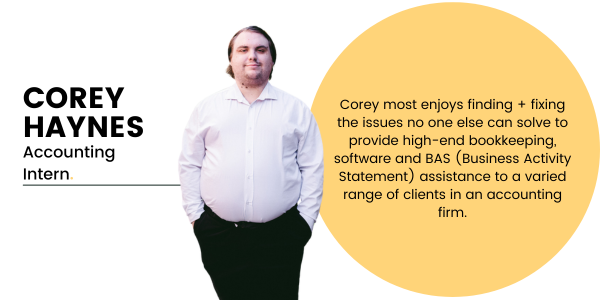Your 2025 Income Tax Return Checklist
Written by: Corey Haynes | Accounting Team
Tax time doesn’t have to be taxing, and now is the time to get prepared.
Whether you’re an employee who earns wages, you have investments that earn investment income, you run a business as a sole trader or through an entity like a company or you are a mix of everything, understanding what’s required and being organised now can ensure that you have a smooth transition into the next financial year.
What To Consider Before Completing Your Tax Return
Before you start pulling out the shoebox of receipts or scanning through emails, take a step back and assess your current financial situation.
It’s currently June, and there is still plenty of time to do some tax planning before the end of the financial year hits. Remember, good tax planning can potentially give you an idea of how the year will fall for tax and whether or not there is anything you need to do before 30 June comes.
Consider:
- Have there been any significant changes in your income, employment, or investments over the past year?
- Did you start a new job, receive government benefits, earn rental income, or sell or buy any assets or property?
- Is there anything you should do before July that will reduce your income or increase your deductions, which will result in a lower tax bill?
All these questions, and many more, will be answered in a proper tax planning session with your accountant.
If you’re a business owner and are looking to get your tax return done, check out this previous blog we put together: Can My Business Get A Tax Refund?
New For 2025: Changes To Income Tax Rates
This 2025 financial year will finish out being the first year we have had the stage 3 tax cuts.
These were initially put together to simplify the tax brackets and ease pressure on middle-income earners.
As of 1 July 2024, the updated personal income tax rates for resident taxpayers above the age of 18 are:
| Taxable income | Tax on this income |
| $0 – $18,200 | Nil |
| $18,201 – $45,000 | $0.16 for each $1 over $18,200 |
| $45,001 – $135,000 | $4,288 plus $.30 for each $1 over $45,000 |
| $135,001 – $190,000 | $31,288 plus $.37 for each $1 over $135,000 |
| Over $190,000 | $51,638 plus $.45 for each $1 over $190,000 |
These changes are significant, especially for those earning between $45,000 and $135,000, who now benefit from a reduced flat rate of 30%. These tax cuts will have already been factored into your regular pay, so remember, don’t expect an increase in your tax refund.
Common Tax Obligations + Changes To Be Aware Of
The Australian tax system can be complex, especially if you have multiple income sources. Whether you’re an employee or self-employed, tax obligations are common across the board.
Income Reporting Requirements:
You must report all income on your return, which can include items such as:
- Wages and salaries, including reportable superannuation contributions, reportable fringe benefits, allowance and employee termination payments;
- Investment income like dividends, interest, and distributions;
- Rental property income;
- Capital gains on the sale of assets (including cryptocurrency!);
- Partnership and trust income from related partnerships or trusts;
- Foreign and overseas income, such as foreign pensions, foreign investment income or foreign wages;
- Certain government payments and allowances;
- Certain superannuation pensions and annuity payments; and
- Certain compensation and insurance payments.
The Australian Taxation Office (ATO) have data-matching tools that can often identify the above without a taxpayer’s input, so ensure you report correctly – the ATO may be able to find out if you haven’t.
ATO Interest No Longer Tax Deductible
For the first time in history, legislation has been pushed through the government that disallows deductions for interest incurred on ATO debts.
This applies from 1 July 2025, so be aware that if you owe the ATO a debt, now may be the time to consider your options to move your debts away from the ATO to other debts that are still considered tax deductible.
Foreign Resident Property Sales – Withholding Changes
From 1 January 2025, the withholding tax rate on property sales by foreign residents has increased from 12.5% to 15%, and the $750,000 threshold for triggering the withholding has been removed entirely. This means all Australian property sales by foreign residents are now subject to withholding regardless of the sale price.
If you’re an Australian resident selling property, you’ll now need to obtain a clearance certificate from the ATO to avoid this withholding.
Documents to Have on Hand + Common Tax Deductions to Consider
When declaring income or claiming deductions, you must have propery documentation to support the information reported.
Essential documents can include:
- PAYG Payment Summaries or Income Statements (if wages are not lodged through STP);
- Bank statements (for interest earned);
- Dividend statements;
- Private health insurance information;
- Records of government payments;
- Rental property documentation such as:
- Agent documentation showing income and expenses;
- Invoices such as council rate notices and water bills; and
- Invoices listing details of any claims for repairs and maintenance of the property.
- Cryptocurrency transaction history;
- Superannuation contributions, which may require lodgement of a Notice of Intent to Deduct if claiming a personal tax deduction; and
- Documentation of a spouse’s income.
Common Tax Deductible Expenses
If you work as an employee, you may be able to claim work-related deductions. If you are self-employed as a sole trader, you may be able to claim deductions against your business income. Some of these deductions may include:
- Work-related expenses such as uniforms, laundry, mobile phone usage, tools, and home office costs;
- Self-education costs directly related to your current role, plus any work conferences and training expenses incurred while attending; and
- Vehicle and travel expenses if you use your own car for work.
Other expenses could be deductible depending on your circumstances and may not relate to work at all (such as donations or income protection insurance premiums). If in doubt, contact your accountant to discuss what you can or cannot claim as a deduction.
HELP/HECS Relief: Indexation Cuts + Debt Reduction
If you’re one of the many Australians with a HELP (formerly HECS) debt, 2025 brings two major pieces of good news:
- Indexation Reduction: From 1 June 2025, the annual indexation rate on HELP debts will drop from 7.1% to 3.2%, slowing the growth of your loan balance.
- One-Off 20% Debt Reduction: All Australians with an outstanding student loan as at 1 June 2025 will receive an automatic 20% reduction to their HELP/VET/Apprenticeship Debt, applied before indexation. It is applied automatically, and no application to the ATO will need to be lodged.
- Refunds for Past Indexation: If you paid off your HELP debt after indexation was applied in 2023 or 2024, you may be eligible for a credit or refund depending on your circumstances. These refunds are expected to be processed by early 2025.
Ensuring Accuracy On Your Income Tax Return
Remember, it is a legal requirement to file an accurate and correct tax return. Errors, whether accidental or on purpose, can trigger audits, penalties, and/or interest charges, so it’s important to ensure you file correctly the first time whenever possible.
Some of the most common mistakes can include:
- Failing to report all income;
- Over-claiming deductions or claiming deductions in the wrong tax year (check the date!);
- Using estimates rather than exact figures; and
- Lodging without reviewing third-party pre-fill data.
Key Dates To Keep In Mind For Your 2025 Tax Return
When it comes to lodging your tax return, timing is everything. Here’s what you need to know about the 2025 income tax return deadlines:
For Individuals Who Self-Lodge:
- Lodgement opens: 1 July 2025
- Deadline to lodge: 31 October 2025
If you’re preparing and lodging your own return through MyGov without a registered Tax Agent, this is your final date to lodge. Extensions are generally not granted unless there are extenuating circumstances.
For Individuals Who Lodged Through a Tax Agent:
- Register with an agent: Before 31 October 2025
If you’re using a registered tax agent like Canny Group, you may be eligible for an extended deadline of up to May 2026. Most taxpayers will receive this new due date, but there may be certain circumstances, such as having overdue tax returns, that will mean the due date stays on 31 October 2025.
Business Activity Statements (BAS):
- June 2025 BAS: Due 28 July if self-lodging or 25 August 2025 if lodging with a tax or BAS agent.
- Annual GST return: Due at the same time as your tax return.
Superannuation Contributions:
- Deadline for concessional contributions: 30 June 2025
If you’re making voluntary super contributions to claim a deduction, ensure the funds clear before the end of the financial year.
Why Engage An Accountant For Your Tax Return?
While it’s possible to lodge your tax return yourself, having a qualified accountant by your side ensures you’re getting the most out of your return and complying with all regulations.
There are many benefits to working with a tax professional, including:
- Maximise deductions: Accountants know what you can claim, even the lesser-known ones;
- Save time: Let a professional handle the complexity so you can focus on what you do best;
- Stay compliant: Avoid costly mistakes and ensure everything is up to ATO standards; and
- Strategic planning: Accountants offer advice beyond just this year – they help plan too.
Canny Accounting + Your Income Tax Return
At Canny Group, we go beyond just ticking boxes. We believe in educating our clients and working collaboratively to ensure the best outcomes possible. Our experienced teams tailor their advice based on your personal and professional needs, whether you’re an employee, sole trader, or business owner.
The 2025 tax season doesn’t need to be overwhelming. With a solid plan, the right documentation, and expert support, lodging your income tax return can be simple, efficient, and even rewarding.
Don’t wait until the deadline looms. Get in touch with our team today and let us help you take control of your tax return.





